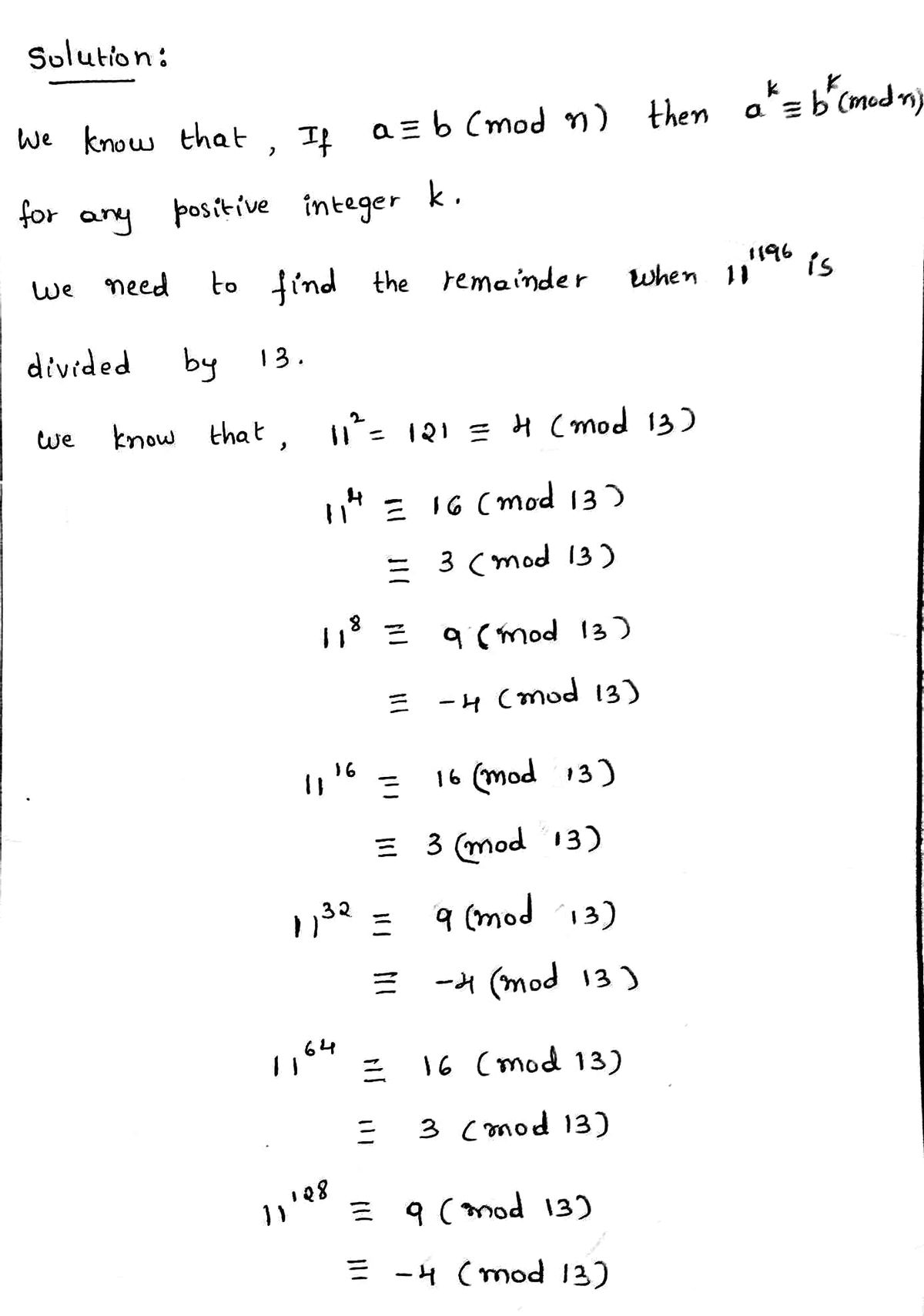Find the remainder when 111196 is divided by 13.
Advanced Engineering Mathematics
10th Edition
ISBN:9780470458365
Author:Erwin Kreyszig
Publisher:Erwin Kreyszig
Chapter2: Second-order Linear Odes
Section: Chapter Questions
Problem 1RQ
Related questions
Question
![**Problem Statement:**
Find the remainder when \( 11^{1196} \) is divided by 13.
---
**Solution Explanation:**
To solve this problem, one can use Fermat's Little Theorem, which states that if \( p \) is a prime number and \( a \) is an integer not divisible by \( p \), then:
\[ a^{p-1} \equiv 1 \pmod{p} \]
In this case, we can apply Fermat’s Little Theorem with \( a = 11 \) and \( p = 13 \).
According to the theorem:
\[ 11^{12} \equiv 1 \pmod{13} \]
Now, we need to find \( 11^{1196} \mod 13 \).
First, calculate the exponent mod 12 (since \( p - 1 = 12 \)):
\[ 1196 \div 12 = 99 \text{ remainder } 8 \]
So, \( 1196 \equiv 8 \pmod{12} \).
Thus:
\[ 11^{1196} \equiv 11^8 \pmod{13} \]
Now we compute \( 11^8 \mod 13 \):
1. \( 11^2 \equiv 121 \equiv 4 \pmod{13} \)
2. \( 11^4 = (11^2)^2 \equiv 4^2 \equiv 16 \equiv 3 \pmod{13} \)
3. \( 11^8 = (11^4)^2 \equiv 3^2 \equiv 9 \pmod{13} \)
Therefore, the remainder when \( 11^{1196} \) is divided by 13 is 9.](/v2/_next/image?url=https%3A%2F%2Fcontent.bartleby.com%2Fqna-images%2Fquestion%2F2a4399a9-5724-42c8-89a0-9bc27dd1a0f2%2F96a6f9a8-ce9f-47cc-89ef-065e3fd0c445%2Fipfaoou_processed.png&w=3840&q=75)
Transcribed Image Text:**Problem Statement:**
Find the remainder when \( 11^{1196} \) is divided by 13.
---
**Solution Explanation:**
To solve this problem, one can use Fermat's Little Theorem, which states that if \( p \) is a prime number and \( a \) is an integer not divisible by \( p \), then:
\[ a^{p-1} \equiv 1 \pmod{p} \]
In this case, we can apply Fermat’s Little Theorem with \( a = 11 \) and \( p = 13 \).
According to the theorem:
\[ 11^{12} \equiv 1 \pmod{13} \]
Now, we need to find \( 11^{1196} \mod 13 \).
First, calculate the exponent mod 12 (since \( p - 1 = 12 \)):
\[ 1196 \div 12 = 99 \text{ remainder } 8 \]
So, \( 1196 \equiv 8 \pmod{12} \).
Thus:
\[ 11^{1196} \equiv 11^8 \pmod{13} \]
Now we compute \( 11^8 \mod 13 \):
1. \( 11^2 \equiv 121 \equiv 4 \pmod{13} \)
2. \( 11^4 = (11^2)^2 \equiv 4^2 \equiv 16 \equiv 3 \pmod{13} \)
3. \( 11^8 = (11^4)^2 \equiv 3^2 \equiv 9 \pmod{13} \)
Therefore, the remainder when \( 11^{1196} \) is divided by 13 is 9.
Expert Solution
Step 1

Step by step
Solved in 4 steps with 3 images

Recommended textbooks for you

Advanced Engineering Mathematics
Advanced Math
ISBN:
9780470458365
Author:
Erwin Kreyszig
Publisher:
Wiley, John & Sons, Incorporated

Numerical Methods for Engineers
Advanced Math
ISBN:
9780073397924
Author:
Steven C. Chapra Dr., Raymond P. Canale
Publisher:
McGraw-Hill Education

Introductory Mathematics for Engineering Applicat…
Advanced Math
ISBN:
9781118141809
Author:
Nathan Klingbeil
Publisher:
WILEY

Advanced Engineering Mathematics
Advanced Math
ISBN:
9780470458365
Author:
Erwin Kreyszig
Publisher:
Wiley, John & Sons, Incorporated

Numerical Methods for Engineers
Advanced Math
ISBN:
9780073397924
Author:
Steven C. Chapra Dr., Raymond P. Canale
Publisher:
McGraw-Hill Education

Introductory Mathematics for Engineering Applicat…
Advanced Math
ISBN:
9781118141809
Author:
Nathan Klingbeil
Publisher:
WILEY

Mathematics For Machine Technology
Advanced Math
ISBN:
9781337798310
Author:
Peterson, John.
Publisher:
Cengage Learning,

